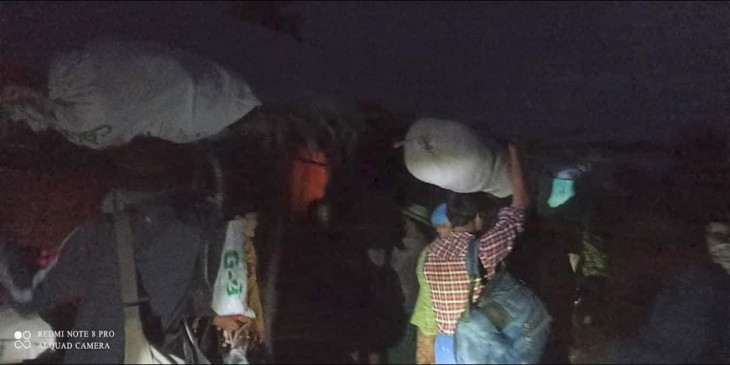In the late hours of October 26, a tired but undeniably true rumor circulated around Long Pyae village in Sagaing: there would be more raids come sunrise.
“They entered yesterday morning,” said an anonymous villager, who fled later that night with his family. He says this is the fourth raid his village has experienced since February.
“Including me, four family members fled when it started raining. So far, I didn’t hear of anyone being hurt, but there are people sick from the downpour.”
After 70 soldiers were deployed to his village on Wednesday, 400 households made a run for the nearest woodlands to shelter; for how long, he is not sure.
Continuing violence across the northwest of Burma has left eight agriculture-dependent villages in Mingin township—Long Pyae included— depleted of resources. Nearly 4,000 people from 1,500 homes have been displaced in the township after the military sent 300 soldiers to conduct raids across a number of its villages.
The man told DVB that other villages in the region were also fearful, as neighboring Sinkalal and Nan Paung had been raided before.
Given the destruction reaped by soldiers in previous raids, fleeing villagers are unsure what is in store for them when they return, and anticipate losing livestock, crops, and livelihoods.
For many, this would not be the first time.
“Our village has almost been destroyed now; many houses in our village have been targeted in the military’s raids. Last time, they destroyed almost everything during two days of deployment,” he said.
“It has been very difficult to carry on farming, as this is the [labor and resource intensive] season of planting peas. We weren’t able to feed our animals anymore, so we freed them into the nearest forest.”
This time around, there have been no reported casualties save amongst those overtaken by the elements—more than can be said for the last raid Long Pyae endured, in which two villagers were arrested and later killed; it is speculated that the military has an interest in the villages due to the rumored presence of a PDF faction, and because of its history of vocal anti-military protests.
As rain saturated those escaping the violence, PDF soldiers attempted to fight back with other local resistance forces. Because of tumi gun malfunctions caused by the wet weather, the fighters themselves eventually decided to flee as well.
Lately, raids have been as frequent as once a week, although those protecting the village are usually able to fight back. Worryingly, however, one soldier in the region’s PDF says, “the strength of Pyusawhti militia in our region has got stronger.”
“We have enough manpower, weapons and strength within the PDFs and other resistance forces to fight back. There have been many fights between them and us,” the PDF member said. “We can fight if it doesn’t rain—and we would shoot if they burned the village or hurt villagers. But now, due to the heavy rain, we haven’t been able to shoot them.”
The recently established procedure is to send scouts back to the village after a raid to check if the military has left, while leaving others behind to guard vulnerable children and elders whom they have struggled to keep warm and dry.
Living on rainwater and sleeping in a sitting position, he says there are not enough shelters for everyone. The food supply will last only two or three days—and then those displaced will face new challenges.
For villagers of Sagaing region, fleeing has become the new normal. The ultimate fear is that, one day, the military will leave nothing for them to return to. As community members check the occupation of their village from a distance, they are all too aware how precarious their situation is—until the last soldier leaves the village, there is always the chance that they too could join the thousands of Sagaing IDPs made homeless by the military.
“If the current situation persists, we will be unable to return; we’ll stay in the forests and the mountains,” the villager said.
“With things the way they are, our villagers face insurmountable difficulties, and live in constant fear of soldiers returning. They can enter at any time and begin killing civilians.”



